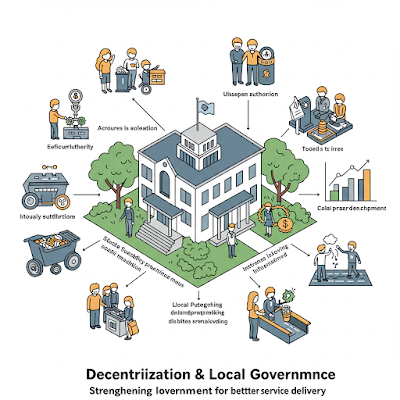Decentralization is a critical aspect of modern governance, enabling local governments to operate autonomously while ensuring efficient service delivery to citizens. By shifting power, responsibilities, and resources from central governments to local authorities, decentralization fosters better governance, improves responsiveness, and enhances public participation in decision-making. This article explores the significance of decentralization, its impact on local governance, and how it strengthens service delivery.
Understanding Decentralization
Decentralization refers to the process of transferring political, administrative, and fiscal powers from central governments to local or regional authorities. It is implemented in various forms, including:
1. Political Decentralization
-
Grants local governments authority to make policy decisions.
-
Encourages citizen participation in governance.
-
Promotes democratic values and accountability.
2. Administrative Decentralization
-
Shifts decision-making authority to local government officials.
-
Enhances efficiency by reducing bureaucratic bottlenecks.
-
Allows local authorities to tailor services based on community needs.
3. Fiscal Decentralization
-
Empowers local governments with financial autonomy.
-
Allocates resources to local authorities for effective service delivery.
-
Encourages local revenue generation through taxation and fees.
4. Market or Economic Decentralization
-
Encourages privatization and public-private partnerships (PPPs) in service delivery.
-
Enhances competition, efficiency, and innovation in local economies.
The Role of Decentralization in Strengthening Local Governance
Decentralization plays a vital role in making governance more efficient and responsive. Some of its key benefits include:
1. Improved Public Service Delivery
-
Local governments have better knowledge of community needs and can design services accordingly.
-
Faster response to local issues, reducing delays in decision-making.
-
Enhanced efficiency in managing public resources and infrastructure.
2. Enhanced Citizen Participation and Accountability
-
Encourages local communities to engage in decision-making processes.
-
Strengthens accountability as local leaders are directly answerable to the people.
-
Builds trust in governance by fostering transparency.
3. Economic Growth and Development
-
Encourages local entrepreneurship and small business development.
-
Enhances investment in infrastructure, education, and healthcare at the local level.
-
Promotes regional development and reduces economic disparities.
4. Greater Innovation and Policy Experimentation
-
Local governments can test and implement innovative solutions for governance.
-
Enables adaptation of policies to specific regional contexts.
-
Encourages competition between local authorities, leading to improved services.
Challenges of Decentralization and Local Governance
Despite its numerous benefits, decentralization faces several challenges that can hinder effective local governance:
1. Lack of Financial Resources
-
Many local governments depend heavily on central funding, limiting their financial autonomy.
-
Inadequate revenue generation mechanisms can weaken service delivery.
2. Weak Institutional Capacity
-
Local governments often lack skilled personnel and resources to manage decentralized functions.
-
Limited training and expertise in public administration can lead to inefficiencies.
3. Corruption and Mismanagement
-
Decentralization can sometimes increase opportunities for local-level corruption.
-
Weak oversight and lack of accountability mechanisms can lead to misuse of funds.
4. Inequality in Resource Distribution
-
Some regions may receive more resources than others, leading to disparities in development.
-
Urban areas may benefit more from decentralization than rural communities.
Strategies to Strengthen Local Governance for Better Service Delivery
To overcome these challenges and enhance local governance, governments and stakeholders should adopt the following strategies:
1. Strengthening Institutional Capacity
-
Provide training programs for local government officials.
-
Invest in digital tools and technologies to improve efficiency.
-
Establish clear policies and guidelines for local administration.
2. Enhancing Financial Autonomy
-
Develop sustainable revenue generation models for local governments.
-
Encourage local taxation, property taxes, and service fees to boost funding.
-
Implement transparent budgeting and financial management systems.
3. Ensuring Accountability and Transparency
-
Strengthen anti-corruption frameworks and local watchdog institutions.
-
Promote citizen engagement through public forums and partici


No comments:
Post a Comment